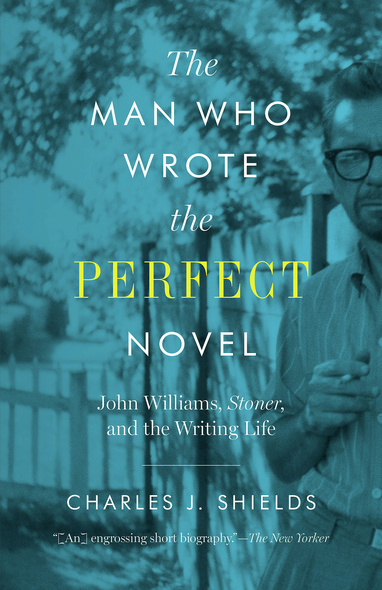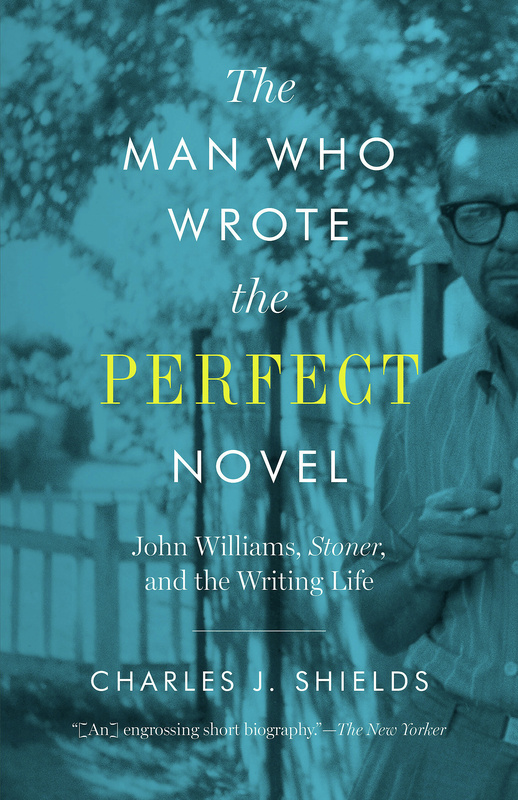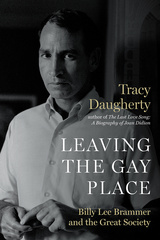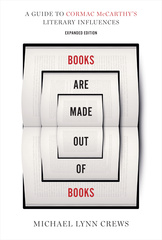The Man Who Wrote the Perfect Novel
John Williams, Stoner, and the Writing Life
When Stoner was published in 1965, the novel sold only a couple of thousand copies before disappearing with hardly a trace. Yet John Williams’s quietly powerful tale of a Midwestern college professor, William Stoner, whose life becomes a parable of solitude and anguish eventually found an admiring audience in America and especially in Europe. The New York Times called Stoner “a perfect novel,” and a host of writers and critics, including Colum McCann, Julian Barnes, Bret Easton Ellis, Ian McEwan, Emma Straub, Ruth Rendell, C. P. Snow, and Irving Howe, praised its artistry. The New Yorker deemed it “a masterly portrait of a truly virtuous and dedicated man.”
The Man Who Wrote the Perfect Novel traces the life of Stoner’s author, John Williams. Acclaimed biographer Charles J. Shields follows the whole arc of Williams’s life, which in many ways paralleled that of his titular character, from their shared working-class backgrounds to their undistinguished careers in the halls of academia. Shields vividly recounts Williams’s development as an author, whose other works include the novels Butcher’s Crossing and Augustus (for the latter, Williams shared the 1972 National Book Award). Shields also reveals the astonishing afterlife of Stoner, which garnered new fans with each American reissue, and then became a bestseller all over Europe after Dutch publisher Lebowski brought out a translation in 2013. Since then, Stoner has been published in twenty-one countries and has sold over a million copies.
[An] engrossing short biography.
An excellent biography.
Shields…hoovers up the available evidence and shapes it into an episodic narrative without giving much sense of what he makes of his subject…Shields's book is a handy corrective for anyone who's nostalgic for the days when American writers and publishers routinely ran up large bar tabs.
A fine biography of Williams by Charles J. Shields, published by University of Texas Press
This rich biography gives new insight into the enigmatic man behind Stoner, a novel quickly forgotten after its 1963 publication but more recently recognized as a midcentury American classic.
The Williams that emerges is not unlike <i>Stoner</i> himself: self-obsessed, given to petty feuds, and insecure about his abilities...It is to Shields’s credit that by the end of this finely crafted biography readers will feel they have some insight into this talented, troubled enigma of a man.
Despite obvious parallels with his fictional university protagonist, John Williams is both different and interesting enough to merit a book of his own, Charles J. Shields's The Man Who Wrote the Perfect Novel. It certainly helps that, like Williams, Shields know how to tell a good story, one that will appeal especially to those interested in the ins and outs of the publishing industry and the ups and downs of a writer's life.
Charles Shields has done us all a service by pointing up and pointing out the novelist's unyielding ambition and rigor.
[An] exemplary biography, the first devoted to the life of one of America's most unusual writers.
[A] sharp-eyed biography.
Through exhaustive research and sharp prose, Shields has composed a portrait of the complicated author and the particular darknesses that drove Williams to write, to overcompensate, to philander, to mansplain.
Brief but compelling...The Man Who Wrote the Perfect Novel is a welcome reminder that even in the rarefied world of literature, good sometimes prevails.
Shields' writing is captivating and reveals much about the wounded psyches of the GI Bill generation of American (male) authors.
Shields describes Williams's development and motivations and explains persuasively why a writer hungry for fame didn't go in for the postmodernist experiments of his time.
Shields accomplishes an admirable feat of objectivity in a biography published during our riven age of identity and tribal politics.
[John Williams's Stoner] has in recent decades become the sort of book that people adore, give to their friends, fiercely identify with, and dub 'the perfect novel.' And full credit to Charles Shields for going behind the scenes to fill in the picture of Williams's own—somewhat similarly miserable—life…Stoner's rediscovery reflects well on the artisanship of John Williams, a novelist whose accomplishments and foibles Charles Shields has brought ably into view.
Charles Shields's biography of John Williams invites us to enrich our understanding of Stoner—and Williams's other writings as well—in The Man Who Wrote the Perfect Novel. Through his accessible style, his scrupulous attention to detail, and his use of source material and interviews, Shields provides us with a balanced study of a writer whose work has the power to transform the unremarkable into the astonishing.
Charles J. Shields' subtitle accurately captures the scope, purpose, and content of the book. It's a biography of John Williams. It's a description of how Williams's major work came to be, and it's a reflection on the writing life, as lived by John Williams. I found Shields to be fair in his approach to all three.
An expert uncovering of an American master who deserves the larger audience this biography will help give him. With his characteristic insight into the ligatures between life and art, and in his own enviable prose, Shields brings Williams into full-color relief. This is a major accomplishment by a major biographer, a gift for which Williams’s admirers will be most grateful.
Charles Shields’s biography of John Williams is every bit as impressive as his subject’s book, the not-so-underground classic (and international bestseller) Stoner, a gripping and compulsively readable tale of an ‘unremarkable man.’ Shields brilliantly recreates Williams’s outwardly ordinary life as an English professor eager to balance his scholarship with a creative writing career, revealing fascinating psychological depths in a man who on the surface doesn’t seem to have any. The reader is carried along by this masterful, finely honed biography.
A masterful depiction of the generation of burnt-out alcoholic American writers who survived WWII. Shields comes about as close as humanly possible to recreating the crucible of chance, devotion, genius, and circumstance that produced ‘the greatest novel you have never read.’
Charles J. Shields is the author of Mockingbird: A Portrait of Harper Lee, a New York Times bestseller, a Literary Guild Selection, and a Book-of-the-Month Club Alternate. His young adult biography of Harper Lee, I Am Scout, was chosen an ALA Best Book for Young Adults, a Bank Street Best Children’s Book of the Year, and a Junior Literary Guild Selection. In 2011, Shields published And So It Goes: Kurt Vonnegut, A Life, a New York Times and Washington Post Notable Nonfiction Book of the Year.
- Introduction
- Part I. Nothing But the Night
- Chapter One: He Comes from Texas
- Chapter Two: “Ho, Ho! Wasn’t I the Character Then?”
- Chapter Three: Rough Draft
- Chapter Four: Key West
- Chapter Five: Alan Swallow
- Chapter Six: Love
- Part II. Butcher’s Crossing
- Chapter Seven: The Winters Circle
- Chapter Eight: “Natural Liars Are the Best Writers”
- Chapter Nine: Butcher’s Crossing
- Chapter Ten: Fiasco
- Part III. Stoner
- Chapter Eleven: “It Was That Kind of World”
- Chapter Twelve: “The Williams Affair”
- Chapter Thirteen: Stoner
- Part IV. Augustus
- Chapter Fourteen: Bread Loaf and “Up on the Hill”
- Chapter Fifteen: The Good Guys
- Chapter Sixteen: “Long Life to the Emperor!”
- Part V. The Sleep of Reason
- Poem: “An Old Actor to His Audience”
- Chapter Seventeen: “How Can Such a Son of a Bitch Have Such Talent?”
- Chapter Eighteen: In Extremis
- Epilogue. John Williams Redux
- Acknowledgments
- Notes
- Works Consulted
- A John Williams Bibliography
- Index







